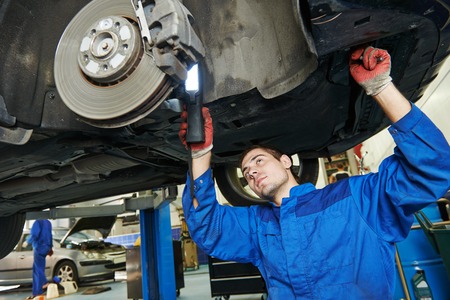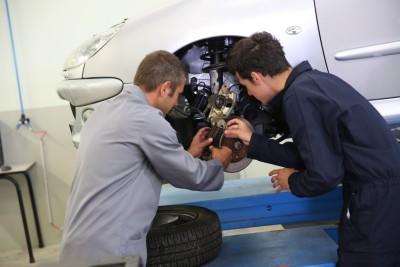
So what should vehicle owners know about their brakes?
Well, the short answer is this: if your brakes aren’t working, you’re in trouble!
Obviously, cars need brakes to work well, in order to slow down and stop. Without brakes, there’d be plenty of crashes.
Technical Aspects of Brakes
What about some of the technical aspects about how brake systems work these days? Well, most cars and trucks utilize hydraulic power to help improve braking force and efficiency. Hydraulic power is defined as power transmitted by the controlled circulation of pressurized fluid to a motor that converts it into a mechanical output capable of doing work on a load. With vehicles, hydraulic brake fluid fills a master cylinder that also contains a piston and spring. Say you’re driving a vehicle and you press down on the brake pedal– that’s when the piston and spring push the fluid through a brake like into what’s known as a slave cylinder, which then transfers forces to the brake assemblies attached to the vehicle’s wheels. So now you know a little more about how the braking system works…
As for the actual brakes– they can either be disc brakes, drum brakes or a combination of both. Disc brakes involve a flat metal disc (or rotor) with calipers on their inner and outer sides. Hydraulic pressure forces pistons to squeeze the calipers shut, and there are pads on the inner surfaces which provide friction to slow/stop the wheel rotation. Drum brakes have hollow drum-shaped pieces with “shoes” (similar to brake pads) operated by springs and pistons. Pressure is sent to the pistons via the slave cylinder such that the shoes are forced outward, contacting the inner lining of the drum. Thanks to friction, the wheel rotation slows/stops.
Brake Performance

How do you know if your brakes aren’t working well? If you notice a puddle under your vehicle, it could be that you have a brake fluid leak or a leak in a brake line. Meanwhile, if you press on the brake pedal and it doesn’t feel “normal,” that could be a problem. Listen for squealing or grinding sounds coming from your tire areas. Brake pads will squeal when they’re thinning, and a grinding sound could indicate your pads have worn out completely. If you notice your vehicle pulls to one side, that could indicate one of your calipers or brake hoses isn’t working properly. And, if you notice a “brake light” on your dashboard, that’s a reason to have a mechanic take a look.
With most vehicles, there will be brake issues over time. After all, they’re a well-used component, right? Typically, car owners will need to get new brake pads, rotors and/or hoses. Eventually, they might need to replace components like discs, drums or master/slave cylinders.
If and when you are experiencing brake problems, you don’t want to wait to get the vehicle checked, for safety’s sake. If and when your brakes fail, you could risk serious injury or death, and put other people in harm’s way.
In Lancaster, CA, you can have your brakes checked, fixed and/or replaced at AV Bumper to Bumper. Located at 44559 N. Division St. in Lancaster, AV Bumper to Bumper offers brake services and more. In an era when it seems like everything is a faceless corporation, know that AV Bumper to Bumper is a family-run business. The Fawcett family believes in providing customers with quality work at a fair price. Please call 661-949-1999 with any questions you might have and/or to make an appointment for brake services on your vehicle.




